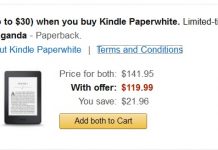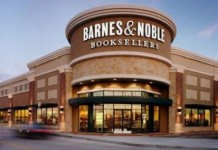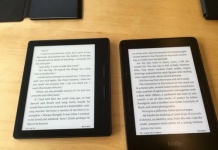The latest in a long series of analyses of the Penguin Random House merger, the Apple price fixing verdict, and the difficulties of Barnes & Noble as all chapters in some great “Lord Of The Rings”-style epic struggle against the encroaching forces of darkness in the shape of Amazon, with its regiments of marching Kindles, comes, perhaps not surprisingly, from the pen of New York Times columnist David Carr.
Carr has an illustrious track record as an Amazon-basher, so it’s not unusual to see more of the same on display here.
“So far, what has been bad for the industry has not yet hit consumers directly. If they are among the many millions of people enthralled by CBS’s ‘Under the Dome,’ and decide to read the giant Stephen King novel that inspired it, they can hop on Amazon and buy it with a click for $13.99. Or they could avoid its door-stopping heft and spend just $7.99 for the Kindle version.”
 God forbid: Publishers now may have to sell books more cheaply to a wider public using a distribution mechanism that brings considerable convenience benefits to the customer—and still reap their share of the rewards.
God forbid: Publishers now may have to sell books more cheaply to a wider public using a distribution mechanism that brings considerable convenience benefits to the customer—and still reap their share of the rewards.
Back in FMCG 101, that used to be what was referred to as a “win/win can’t-lose” situation. But no: “while publishers revel in the robust margins provided by e-books—no manufacturing, no shipping and no remaindering—the growth of Amazon leaves them as secondary characters in a business they used to control.”
You’d wonder why an industry that can throw up the kind of scams typified by Author Solutions deserves any sympathy. But that doesn’t stop Carr. “After Borders called it quits two years ago this week, Barnes & Noble became the last big chain where publishers could get the exposure for their books that allows readers to discover them, and to sell all manner of books big and small that are still part of the foundation of the industry,” he avers.
True, it may be the last bricks-and-mortar walk-in chain where they can do that. But everyone with any skin in the publishing game these days, self-publishing or otherwise, knows that securing exposure and visibility is the number one priority nowadays, only it’s done online. And all manner of books great or small can be sold through Amazon, whether its print book storefront or Kindle editions. Amazon’s cardinal sin against the publishing industry is probably less that it cuts out the bookstore middleman than that it took a large slice of control of visibility out of the hands of publishers and handed it to customers by letting them see what was most popular.
Carr recklessly elides technological change and the decline of the bookstore with the publishing industry’s practices and the supposed offenses of Amazon. But all these parts do not add up. “Bookstores offer discoverability, not just the latest Dan Brown or Carl Hiaasen book on the front table, but sometimes treasures deep in the stacks, a long tail of midlist authors and specialty books,” he declares. “Even as the book business consolidates, the physical object displayed in an actual place will continue to be an important part of the ecosystem.”
That second sentence absolutely does not equate with the first. I can discover very much more on the Web, instantly, than I can in a bookstore. I presume Carr knows that too. Why doesn’t he say so?
Amazon’s supposed monopoly is a symptom of what the bookstores, and Barnes & Noble, got wrong. And publishers are most likely now to conspire full tilt with Amazon, or Apple, because they still refuse to do the one obvious thing, which is retail their own content directly without DRM. They’d far rather stay locked in to the biggest DRM game in town and All Your Search Belong to Az, and let the bookstores go to hell.
As it happens, I agree with Carr that B&N is good for Amazon. Like Apple once did for Microsoft, in a galaxy far far away and a $150 million investment in 1997, B&N can be Amazon’s fig leaf against accusations of monopoly. And despite articles like this, some officials might start to take the plaints of Carr and his ilk seriously.



































He clearly hasn’t read The Long Tail, so he shouldn’t be referring to the concept. By it’s nature, the long tail can’t exist in a brick and mortar store. Not enough room.
And ironically, the author of The Long Tail referenced Amazon as a classic example of the concept in action.
I love it when people use terms they don’t understand.
He really should fess up which publisher(s) he works for. All six (five now) of em?